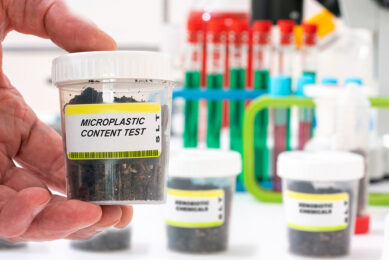Insect protein – lights, camera, larvae

It is not every day as an entomologist that you find yourself away from the lab or lecture hall and in front of the TV cameras filming for the BBC’s Countryfile, a programme I have followed for some time.
With a weekly audience of over 7 million for this programme, the chance to tell consumers about the fantastic work of the PROteINSECT project team was too good to miss. Lab coat on, fly larvae and feed trials at the ready, take one…
Experts to explore insect potential
So what is the project about? PROteINSECT is an EC funded research programme with partners in Europe, China and Africa. The focus of the project is to enable the exploitation of insects as a sustainable source of protein for animal feed and human nutrition. PROteINSECT contains a collection of scientists who hold expertise in differing areas of relevance to the project able to dedicate time and resources to undertake state of the art science to further understand the protein potential of insects. Whilst this is not without its challenges we have and will continue to deliver scientific output within the fields of fly production systems, quality and safety assessments, processing and animal feeding trials as well as Life Cycle Analyses of different production scenarios.
Outreach
As with any scientific research the importance of dissemination and communication of all of our work is fundamental to making a significant and lasting impact. The team is working hard to undertake this activity alongside their research through a variety of outlets, the most recent was an exclusive on the BBC’s Countryfile. It is vital during knowledge exchange to give members of the public a chance to formally have their say on a topic. As I am sure you can understand consumer perception is critical to the future potential adoption of insect protein in animal feed – a lesson well learned from GMO. So over the last few months PROteINSECT has been conducting a multi-language consumer perception survey on animal feed, including but not exclusive to insect meal.
So why take this approach?
It is essential to understand consumer perceptions on an emerging topic but also to have the ability to measure perception against existing alternatives so that we can understand both relative and actual acceptability. Early results from the English language version of our survey have showed real promise with over three quarters of those surveyed being very comfortable or somewhat comfortable eating meat from a farmed animal (including fish) that has been fed on insect protein. This statistic is not however a complete surprise with results of the first PROteINSECT consumer survey (May 2014) highlighting that over 70% of people asked would be willing to eat fish, chicken or pork from animals fed on a diet containing insect protein, Verbeke et al. (Ghent University) also found high levels of acceptance with two thirds of their survey participants willing to accept use of insects in animal feed.
Comfortable eating insects?
The overall benefit of the PROteINSECT approach is that we can understand what three quarters of ‘comfort’ really means as a comparator to existing and proposed sources of protein in animal feed whist also acknowledging that 15% are not comfortable eating farmed animals that have been feed on insect protein. The early results from our survey demonstrate that consumers are ‘more comfortable’ with insect protein in animal feed than existing GM crops which achieved 43% rating very comfortable / comfort, or fish meal which achieved 59%.
Next steps
The PROteINSECT team is continuing to analyse the full data set from the five language surveys and results including consumer’s perception of risk, environmental impact and feed knowledge and we will be making the results publically available on PROteINSECT website in December. If you would like to know more about our work, please email info@proteinsect.eu or sign up for our newsletter.
PROteINSECT is funded by the European Union’s Seventh Framework Programme for research, technological development and demonstration.











